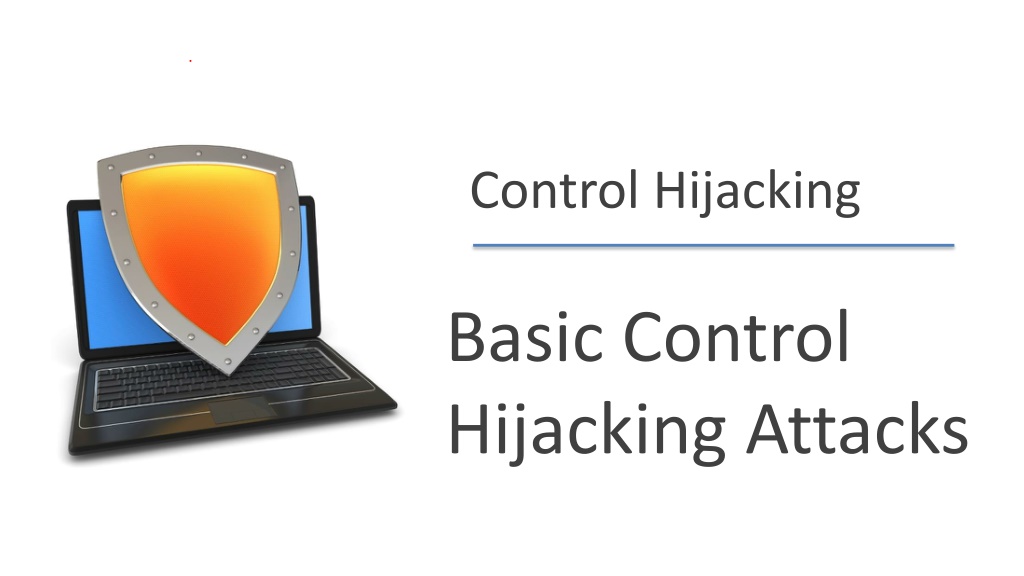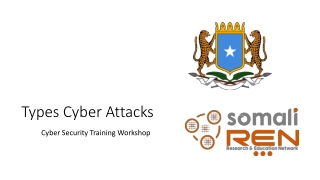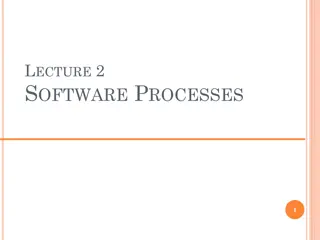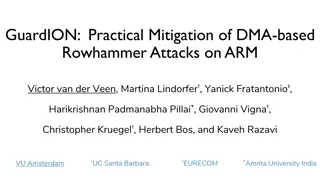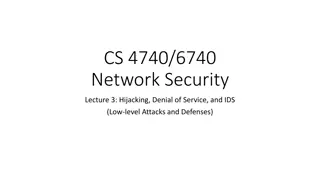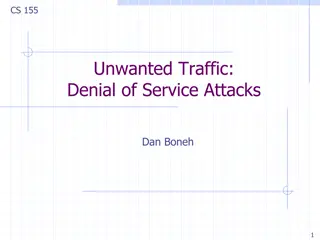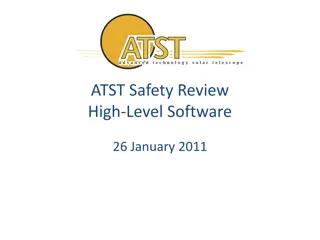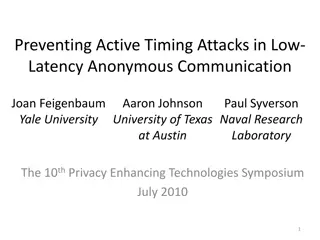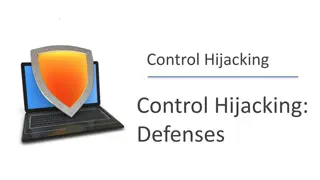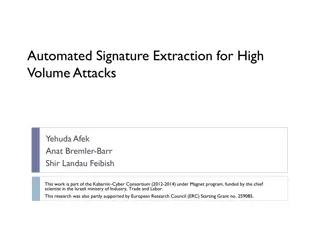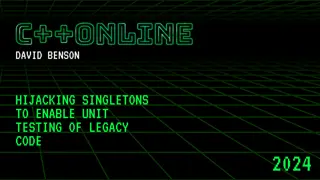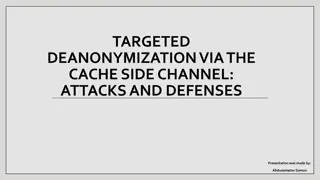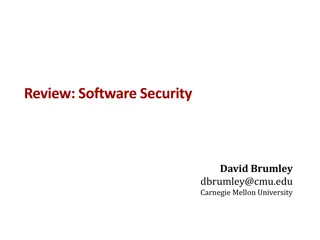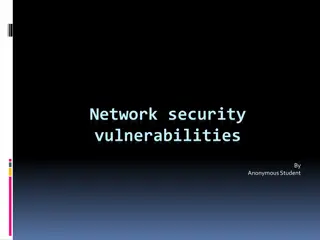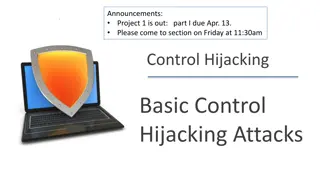Understanding Control Hijacking Attacks in Software Systems
Control hijacking attacks, such as buffer overflows and format string vulnerabilities, allow attackers to take over a target machine by manipulating application control flow. Knowledge of C functions, system calls, CPU, and OS used is crucial for executing these attacks successfully. This summary provides insights into the stack, heap, and system call mechanisms exploited in control hijacking attacks.
Download Presentation

Please find below an Image/Link to download the presentation.
The content on the website is provided AS IS for your information and personal use only. It may not be sold, licensed, or shared on other websites without obtaining consent from the author. Download presentation by click this link. If you encounter any issues during the download, it is possible that the publisher has removed the file from their server.
E N D
Presentation Transcript
Control Hijacking Basic Control Hijacking Attacks Dan Boneh
Control hijacking attacks Attacker s goal: Take over target machine (e.g. web server) Execute arbitrary code on target by hijacking application control flow Examples. Buffer overflow attacks Integer overflow attacks Format string vulnerabilities Dan Boneh
Example 1: buffer overflows Extremely common bug in C/C++ programs. First major exploit: 1988 Internet Worm. fingerd. 600 500 20% of all vuln. 400 300 200 100 Source: NVD/CVE 0 1995 1997 1999 2001 2003 2005 Dan Boneh
What is needed Understanding C functions, the stack, and the heap. Know how system calls are made The exec() system call Attacker needs to know which CPU and OS used on the target machine: Our examples are for x86 running Linux or Windows Details vary slightly between CPUs and OSs: Little endian vs. big endian (x86 vs. Motorola) Stack Frame structure (Unix vs. Windows) Dan Boneh
Linux process memory layout 0xC0000000 user stack %esp shared libraries 0x40000000 brk run time heap Loaded from exec 0x08048000 0 unused Dan Boneh
Stack Frame high arguments return address stack frame pointer exception handlers local variables Stack Growth callee saved registers SP low Dan Boneh
What are buffer overflows? void func(char *str) { char buf[128]; Suppose a web server contains a function: When func() is called stack looks like: strcpy(buf, str); do-something(buf); } argument: str return address stack frame pointer char buf[128] SP Dan Boneh
What are buffer overflows? void func(char *str) { char buf[128]; What if *str is 136 bytes long? After strcpy: strcpy(buf, str); do-something(buf); } argument: str return address stack frame pointer *str Problem: no length checking in strcpy() char buf[128] SP Dan Boneh
Basic stack exploit high Program P Suppose *str is such that after strcpy stack looks like: Program P: exec( /bin/sh ) (exact shell code by Aleph One) return address When func() exits, the user gets shell ! Note: attack code P runs in stack. char buf[128] low Dan Boneh
The NOP slide high Program P Problem: how does attacker determine ret-address? NOP Slide Solution: NOP slide return address Guess approximate stack state when func() is called Insert many NOPs before program P: nop , xor eax,eax , inc ax char buf[128] low Dan Boneh
Details and examples Some complications: Program P should not contain the \0 character. Overflow should not crash program before func() exists. (in)Famous remote stack smashing overflows: (2007) Overflow in Windows animated cursors (ANI). LoadAniIcon() (2005) Overflow in Symantec Virus Detection test.GetPrivateProfileString "file", [long string] Dan Boneh
Many unsafe libc functions strcpy (char *dest, const char *src) strcat (char *dest, const char *src) gets (char *s) scanf ( const char *format, ) and many more. Safe libc versions strncpy(), strncat() are misleading e.g. strncpy() may leave string unterminated. Windows C run time (CRT): strcpy_s (*dest, DestSize, *src): ensures proper termination Dan Boneh
Buffer overflow opportunities Exception handlers: (Windows SEH attacks) Overwrite the address of an exception handler in stack frame. Function pointers: (e.g. PHP 4.0.2, MS MediaPlayer Bitmaps) Heap or stack FuncPtr buf[128] Overflowing buf will override function pointer. Longjmp buffers: longjmp(pos) (e.g. Perl 5.003) Overflowing buf next to pos overrides value of pos. Dan Boneh
Corrupting method pointers Compiler generated function pointers (e.g. C++ code) method #1 method #2 method #3 FP1 FP2 FP3 ptr data vtable NOP slide shell code Object T After overflow of buf : data ptr buf[256] vtable object T Dan Boneh
Finding buffer overflows To find overflow: Run web server on local machine Issue malformed requests (ending with $$$$$ ) Many automated tools exist (called fuzzers next module) If web server crashes, search core dump for $$$$$ to find overflow location Construct exploit (not easy given latest defenses) Dan Boneh
Control Hijacking More Control Hijacking Attacks Dan Boneh
More Hijacking Opportunities Integer overflows: (e.g. MS DirectX MIDI Lib) Double free: double free space on heap Can cause memory mgr to write data to specific location Examples: CVS server Use after free: using memory after it is freed Format string vulnerabilities Dan Boneh
Integer Overflows (see Phrack 60) Problem: what happens when int exceeds max value? int m; (32 bits) short s; (16 bits) char c; (8 bits) c = 0 c = 0x80 + 0x80 = 128 + 128 s = 0 s = 0xff80 + 0x80 m = 0 m = 0xffffff80 + 0x80 Can this be exploited? Dan Boneh
An example void func( char *buf1, *buf2, unsigned int len1, len2) { char temp[256]; if (len1 + len2 > 256) {return -1} memcpy(temp, buf1, len1); memcpy(temp+len1, buf2, len2); do-something(temp); } // length check // cat buffers // do stuff What if len1 = 0x80, len2 = 0xffffff80 ? len1+len2 = 0 Second memcpy() will overflow heap !! Dan Boneh
Integer overflow exploit stats 140 120 100 80 60 40 20 Source: NVD/CVE 0 1996 1998 2000 2002 2004 2006 Dan Boneh
Format string bugs Dan Boneh
Format string problem int func(char *user) { fprintf( stderr, user); } Problem: what if *user = %s%s%s%s%s%s%s ?? Most likely program will crash: DoS. If not, program will print memory contents. Privacy? Full exploit using user = %n Correct form: fprintf( stdout, %s , user); Dan Boneh
Vulnerable functions Any function using a format string. Printing: printf, fprintf, sprintf, vprintf, vfprintf, vsprintf, Logging: syslog, err, warn Dan Boneh
Exploit Dumping arbitrary memory: Walk up stack until desired pointer is found. printf( %08x.%08x.%08x.%08x|%s| ) Writing to arbitrary memory: printf( hello %n , &temp) -- writes 6 into temp. printf( %08x.%08x.%08x.%08x.%n ) Dan Boneh
Control Hijacking Platform Defenses Dan Boneh
Preventing hijacking attacks 1. Fix bugs: Audit software Automated tools: Coverity, Prefast/Prefix. Rewrite software in a type safe languange (Java, ML) Difficult for existing (legacy) code 2. Concede overflow, but prevent code execution Add runtime code to detect overflows exploits Halt process when overflow exploit detected StackGuard, LibSafe, 3. Dan Boneh
Marking memory as non-execute (W^X) Prevent attack code execution by marking stack and heap as non-executable NX-bit on AMD Athlon 64, XD-bit on Intel P4 Prescott NX bit in every Page Table Entry (PTE) Deployment: Linux (via PaX project); OpenBSD Windows: since XP SP2 (DEP) Visual Studio: /NXCompat[:NO] Limitations: Some apps need executable heap (e.g. JITs). Does not defend against `Return Oriented Programming exploits Dan Boneh
Examples: DEP controls in Windows DEP terminating a program Dan Boneh
Attack: Return Oriented Programming (ROP) Control hijacking without executing code stack libc.so args ret-addr sfp exec() printf() local buf /bin/sh Dan Boneh
Response: randomization ASLR: (Address Space Layout Randomization) Map shared libraries to rand location in process memory Attacker cannot jump directly to exec function Deployment: (/DynamicBase) Windows7: 8 bits of randomness for DLLs aligned to 64K page in a 16MB region 256 choices Windows 8: 24 bits of randomness on 64-bit processors Other randomization methods: Sys-call randomization: randomize sys-call id s Instruction Set Randomization (ISR) Dan Boneh
ASLR Example Booting twice loads libraries into different locations: Note: everything in process memory must be randomized stack, heap, shared libs, base image Win 8 Force ASLR: ensures all loaded modules use ASLR Dan Boneh
Control Hijacking Run-time Defenses Dan Boneh
Run time checking: StackGuard Many run-time checking techniques we only discuss methods relevant to overflow protection Solution 1: StackGuard Run time tests for stack integrity. Embed canaries in stack frames and verify their integrity prior to function return. Frame 1 Frame 2 top of stack sfp ret str sfp ret str local canary local canary Dan Boneh
Canary Types Random canary: Random string chosen at program startup. Insert canary string into every stack frame. Verify canary before returning from function. Exit program if canary changed. Turns potential exploit into DoS. To corrupt, attacker must learn current random string. Terminator canary: Canary = {0, newline, linefeed, EOF} String functions will not copy beyond terminator. Attacker cannot use string functions to corrupt stack. Dan Boneh
StackGuard (Cont.) StackGuard implemented as a GCC patch Program must be recompiled Minimal performance effects: 8% for Apache Note: Canaries do not provide full protection Some stack smashing attacks leave canaries unchanged Heap protection: PointGuard Protects function pointers and setjmp buffers by encrypting them: e.g. XOR with random cookie Less effective, more noticeable performance effects Dan Boneh
StackGuard enhancements: ProPolice ProPolice (IBM) - gcc 3.4.1. (-fstack-protector) Rearrange stack layout to prevent ptr overflow. args ret addr String Growth Protects pointer args and local pointers from a buffer overflow SFP CANARY local string buffers Stack Growth pointers, but no arrays local non-buffer variables copy of pointer args Dan Boneh
MS Visual Studio /GS [since 2003] Compiler /GS option: Combination of ProPolice and Random canary. If cookie mismatch, default behavior is to call _exit(3) Function prolog: sub esp, 8 // allocate 8 bytes for cookie mov eax, DWORD PTR ___security_cookie xor eax, esp // xor cookie with current esp mov DWORD PTR [esp+8], eax // save in stack Function epilog: mov ecx, DWORD PTR [esp+8] xor ecx, esp call @__security_check_cookie@4 add esp, 8 Enhanced /GS in Visual Studio 2010: /GS protection added to all functions, unless can be proven unnecessary Dan Boneh
/GS stack frame args String Growth ret addr Canary protects ret-addr and exception handler frame SFP exception handlers CANARY local string buffers Stack Growth pointers, but no arrays local non-buffer variables copy of pointer args Dan Boneh
Evading /GS with exception handlers When exception is thrown, dispatcher walks up exception list until handler is found (else use default handler) After overflow: handler points to attacker s code exception triggered control hijack Main point: exception is triggered before canary is checked 0xffffffff SEH frame SEH frame high mem ptr to next handler buf next next handler attack code next handler Dan Boneh
Defenses: SAFESEH and SEHOP /SAFESEH: linker flag Linker produces a binary with a table of safe exception handlers System will not jump to exception handler not on list /SEHOP: platform defense (since win vista SP1) Observation: SEH attacks typically corrupt the next entry in SEH list. SEHOP: add a dummy record at top of SEH list When exception occurs, dispatcher walks up list and verifies dummy record is there. If not, terminates process. Dan Boneh
Summary: Canaries are not full proof Canaries are an important defense tool, but do not prevent all control hijacking attacks: Heap-based attacks still possible Integer overflow attacks still possible /GS by itself does not prevent Exception Handling attacks (also need SAFESEH and SEHOP) Dan Boneh
What if cant recompile: Libsafe Solution 2: Libsafe (Avaya Labs) Dynamically loaded library (no need to recompile app.) Intercepts calls to strcpy (dest, src) Validates sufficient space in current stack frame: |frame-pointer dest| > strlen(src) If so, does strcpy. Otherwise, terminates application top of stack src buf sfp ret-addr sfp ret-addr dest Libsafe strcpy main Dan Boneh
More methods StackShield At function prologue, copy return address RET and SFP to safe location (beginning of data segment) Upon return, check that RET and SFP is equal to copy. Implemented as assembler file processor (GCC) Control Flow Integrity (CFI) A combination of static and dynamic checking Statically determine program control flow Dynamically enforce control flow integrity Dan Boneh
Control Hijacking Advanced Hijacking Attacks Dan Boneh
Heap Spray Attacks A reliable method for exploiting heap overflows Dan Boneh
Heap-based control hijacking Compiler generated function pointers (e.g. C++ code) method #1 method #2 method #3 FP1 FP2 FP3 ptr vtable data Object T Suppose vtable is on the heap next to a string object: data ptr buf[256] vtable object T Dan Boneh
Heap-based control hijacking Compiler generated function pointers (e.g. C++ code) method #1 method #2 method #3 FP1 FP2 FP3 vtable ptr data Object T shell code After overflow of buf we have: data ptr buf[256] vtable object T Dan Boneh
A reliable exploit? <SCRIPT language="text/javascript"> shellcode = unescape("%u4343%u4343%..."); overflow-string = unescape( %u2332%u4276%... ); cause-overflow( overflow-string ); // overflow buf[ ] </SCRIPT> Problem: attacker does not know where browser places shellcode on the heap ??? data ptr buf[256] vtable shellcode Dan Boneh
Heap Spraying [SkyLined 2004] Idea: 1. use Javascript to spray heap with shellcode (and NOP slides) 2. then point vtable ptr anywhere in spray area NOP slide shellcode heap vtable heap spray area Dan Boneh
Javascript heap spraying var nop = unescape( %u9090%u9090 ) while (nop.length < 0x100000) nop += nop var shellcode = unescape("%u4343%u4343%..."); var x = new Array () for (i=0; i<1000; i++) { x[i] = nop + shellcode; } Pointing func-ptr almost anywhere in heap will cause shellcode to execute. Dan Boneh
